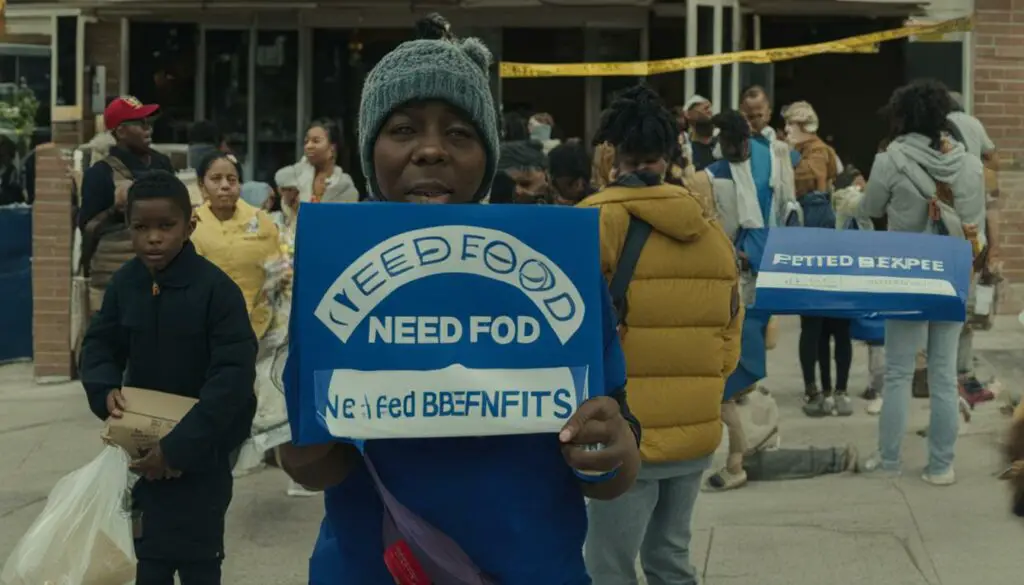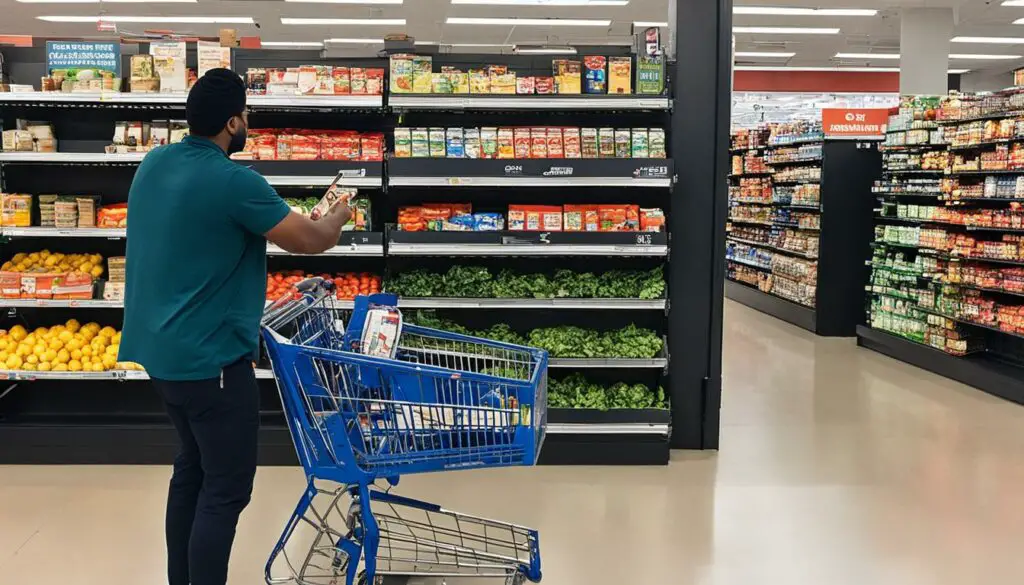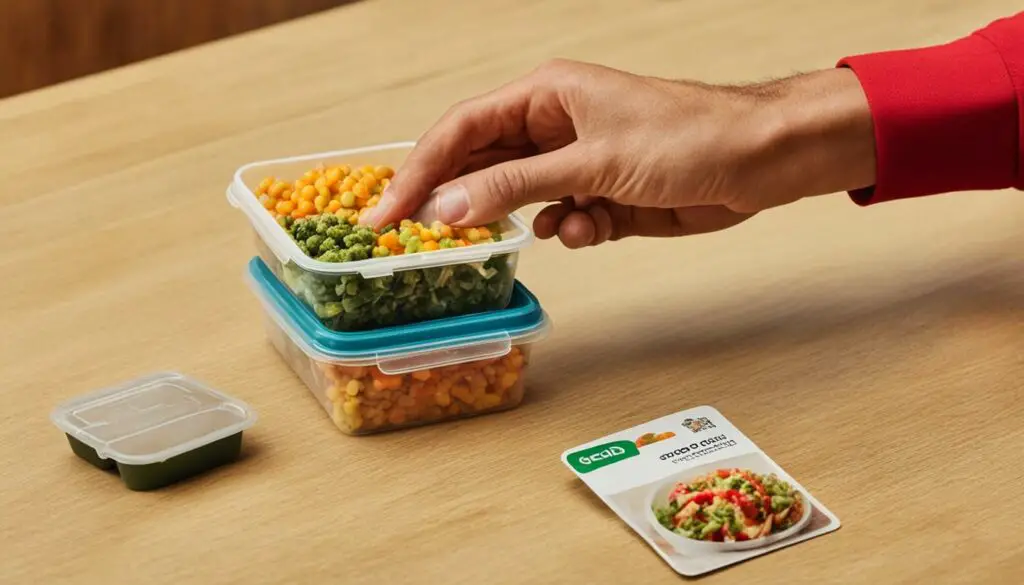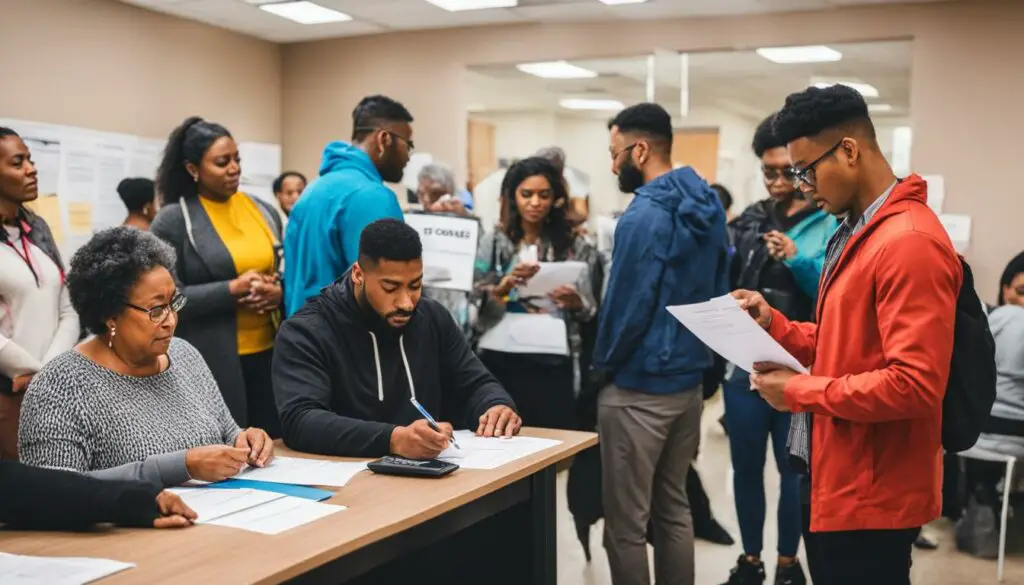Originally posted on December 20, 2023 @ 4:31 pm
Food stamps, also known as the Supplemental Nutrition Assistance Program (SNAP), play a crucial role in providing public assistance to those in need. This government-funded program aims to support low-income individuals and families by helping them meet their nutritional needs. Through the SNAP program, eligible participants receive a cash benefit through an electronic transfer system, which can be used to purchase food.
To qualify for food stamps, individuals must meet certain eligibility criteria, including income and resource limits. These criteria ensure that the program reaches those who truly need it, providing vital assistance to improve their food security and overall well-being.
Table of Contents
Key Takeaways
- Food stamps, also known as the SNAP program, are a form of public assistance.
- They provide a cash benefit to eligible individuals and families to meet their nutritional needs.
- Eligibility criteria, such as income limits, ensure that the program reaches those who need it most.
- Food stamps can be used to purchase eligible food items.
- The program aims to improve food security and the overall well-being of low-income individuals and families.
Public Benefit Programs in New York

In New York, there are several public benefit programs that provide vital support to individuals and families facing financial hardships. These programs aim to alleviate the burden of living expenses and ensure a basic standard of living for those in need. The government support includes Cash Assistance, SNAP, Home Energy Assistance Program (HEAP), NYS Disability Insurance, and various medical coverage programs.
Cash Assistance
Cash Assistance is a crucial public benefit program in New York that offers monthly cash benefits to individuals and families. It is divided into two types: Family Assistance and Safety Net Assistance. Through Cash Assistance, eligible households can receive financial support to cover essential needs such as food, shelter, utilities, and other living expenses.
SNAP (Supplemental Nutrition Assistance Program)
Formerly known as the Food Stamp program, SNAP provides a cash benefit specifically for purchasing food. This program aims to ensure that low-income individuals and families have access to nutritious food. SNAP benefits can be used to buy eligible food items, including fruits, vegetables, dairy products, meats, cereals, bread, and some non-alcoholic beverages.
Home Energy Assistance Program (HEAP)
HEAP is designed to assist households with limited income in paying for their energy costs. This program provides financial support to eligible individuals and families to help them afford heating and cooling expenses. HEAP benefits can be essential for vulnerable individuals during extreme weather conditions, ensuring they can maintain a safe and comfortable living environment.
NYS Disability Insurance
NYS Disability Insurance offers temporary cash benefits to workers who are injured, ill, or experiencing a disability that prevents them from working. This program aims to provide financial support to individuals during their recovery period, ensuring they can meet their basic needs and expenses while unable to work.
Medical Coverage Programs
In addition to the aforementioned benefit programs, New York State also offers various medical coverage programs to individuals and families in need. These programs include Medicaid, which provides healthcare coverage to low-income individuals, and Child Health Plus, which offers affordable health insurance for children.
These public benefit programs play a vital role in supporting individuals and families in New York who are facing financial hardships. They provide much-needed assistance to help cover essential expenses and ensure a basic standard of living. By offering government support through programs like Cash Assistance, SNAP, HEAP, NYS Disability Insurance, and medical coverage programs, New York State aims to improve the well-being of its residents and help them navigate difficult circumstances.
Applying for SNAP

If you’re interested in applying for SNAP benefits in New York, there are a few options available to you.
Online Application: You can apply for SNAP online at myBenefits.ny.gov. Simply visit the website and follow the step-by-step instructions to complete your application.
In-Person Application: If you prefer to apply in person, you can visit your local SNAP office. They will provide you with the necessary forms and guidance to complete your application.
Mailed Application: Alternatively, you can request a mailed application by contacting your local SNAP office or calling the SNAP helpline at 1-800-342-3009. Once you receive the application, fill it out and return it to the provided address.
If you need assistance with the application process, there are community organizations available to help. They can provide guidance, answer your questions, and ensure your application is completed accurately and thoroughly.
SNAP Office Eligibility Interview
After submitting your application, you will be scheduled for an eligibility interview. This interview is typically conducted either in-person or over the phone. During the interview, a SNAP eligibility worker will review your application and ask you questions about your income, household expenses, and other relevant information.
The purpose of the interview is to determine your eligibility for SNAP benefits. It’s important to provide accurate and complete information during the interview to ensure a fair assessment.
Expedited SNAP Benefits
If you have little or no money and need immediate assistance, you may be eligible for expedited SNAP benefits. These benefits are typically provided within seven days of your application. The expedited benefits are for individuals or households that meet certain criteria.
To qualify for expedited benefits, you must have:
- Limited or no accessible resources or income
- Housing costs, utilities, and heating expenses that are greater than your monthly household income and resources
- Less than $150 in monthly gross income and less than $100 in available resources
Expedited benefits can provide immediate support during times of financial hardship, ensuring that you and your household have access to essential food resources.
| Eligibility Category | Gross Monthly Income Limit (130% of Federal Poverty Level) |
|---|---|
| 1 Person | $1,383 |
| 2 People | $1,868 |
| 3 People | $2,353 |
| 4 People | $2,839 |
| 5 People | $3,324 |
Eligibility for SNAP

Eligibility for the Supplemental Nutrition Assistance Program (SNAP) is determined based on various factors, including income, household size, and state-specific guidelines. Qualifying for SNAP benefits can provide essential support to individuals and families in need of assistance. Understanding the eligibility criteria is crucial to determine if you meet the requirements for SNAP.
Income Guidelines
Income guidelines for SNAP vary from state to state and are based on the number of people in the household. In New York, for example, the program allows individuals to have more money in savings or retirement accounts without affecting their eligibility. These income guidelines ensure that SNAP benefits are provided to those who have limited financial resources and need assistance in meeting their nutritional needs.
| Household Size | Maximum Gross Monthly Income |
|---|---|
| 1 | $1,354 |
| 2 | $1,832 |
| 3 | $2,311 |
| 4 | $2,790 |
| 5 | $3,269 |
Note: These are example income guidelines and may vary depending on the state and household size.
Non-Citizens and SNAP Eligibility
Non-citizens may be eligible for SNAP benefits if they fall into certain categories, such as refugees, veterans, or victims of human trafficking. It’s important to note that participating in SNAP does not affect an individual’s immigration status or ability to become a United States citizen or lawful permanent resident. Applying for or receiving SNAP benefits will not be considered in a public charge determination and will not impact an individual’s ability to remain in the United States or keep their immigration status intact.
SNAP and College Students
Most able-bodied college students aged 18-49 are not eligible for SNAP benefits, unless they meet specific criteria. However, there are some exceptions for college students. Eligibility for SNAP as a college student may be possible if the student receives public assistance benefits, participates in a work-study program, works an average of 20 hours per week, or is a single parent enrolled full-time and caring for a dependent household member. Additionally, students attending certain job training programs or specific colleges may also be eligible for SNAP benefits.
What Can You Purchase with SNAP?

SNAP benefits provide individuals and families with access to nutritious food options. These benefits can be used to purchase eligible food items at authorized retail locations, including grocery stores, supermarkets, and farmers markets.
Here is a list of some eligible food items that can be purchased with SNAP benefits:
- Fruits
- Vegetables
- Dairy products
- Meats
- Cereals
- Bread
- Some non-alcoholic beverages
SNAP benefits cannot be used to purchase the following items:
- Alcohol
- Tobacco
- Pet food
- Hot prepared foods
- Non-food items
The goal of the program is to ensure that SNAP recipients have access to essential food items that contribute to a healthy and balanced diet.
| Eligible Food Items | Ineligible Items |
|---|---|
| Fruits | Alcohol |
| Vegetables | Tobacco |
| Dairy products | Pet food |
| Meats | Hot prepared foods |
| Cereals | Non-food items |
| Bread | |
| Some non-alcoholic beverages |
Quoting USDA:
Balancing healthy food choices with your budget means spending your SNAP benefits wisely. The Supplemental Nutrition Assistance Program (SNAP) allows you to buy the food you need, while focusing on good nutrition. SNAP benefits can be used to purchase a variety of eligible food items, giving you the flexibility to choose the products that work best for you and your family.
Closing a SNAP Case

If you find that you or your household no longer require SNAP benefits, it is important to follow the proper steps to close your SNAP case. By promptly closing your case, you can ensure that the resources and assistance are directed to those who truly need them.
To close your SNAP case, you have two options:
- Contact your local SNAP office: You can reach out to your local SNAP office and inform them of your decision to close your case. They will guide you through the necessary steps and provide any required documentation.
- Utilize the online SNAP portal: If your state offers an online portal for SNAP benefits, you can log in and navigate to the appropriate section to close your case electronically. The portal will provide step-by-step instructions on how to proceed.
When closing your SNAP case, it is crucial to notify the SNAP office if there are any changes in your financial circumstances that may affect your eligibility for benefits. This includes changes in income, household composition, or any other relevant information. By keeping the SNAP office informed, you can avoid potential issues such as overpayments or loss of benefits.
Remember, failure to report changes in your financial circumstances can have serious consequences and may result in penalties. It is always best to be proactive and inform the SNAP office promptly.
By taking the necessary steps to close your SNAP case and updating the SNAP office on your financial situation, you can help ensure that the program continues to assist those who truly need it. If you have any questions or need further guidance, reach out to your local SNAP office for assistance.
Requesting a Fair Hearing

If you find yourself in a situation where you disagree with a decision regarding your SNAP benefits or believe that your benefits or services have been changed without notice, you have the right to request a fair hearing. A fair hearing is a formal process where a neutral party reviews your case and makes a decision based on the evidence presented. It provides an opportunity for you to present your side of the story and ensure a fair resolution.
To request a fair hearing, there are several options available to you:
- Online: Visit the official website of your local SNAP office to submit a request for a fair hearing electronically. This method is convenient and allows for quick submission of your request.
- Email, Phone, or Fax: Contact your local SNAP office via email, phone call, or fax to request a fair hearing. Make sure to provide all the necessary details and documentation required to support your claim.
- Mail: Send a written request for a fair hearing to your local SNAP office by mail. Ensure that your request is clearly written and includes all the relevant information and supporting documents.
Timeline for Requesting a Fair Hearing
The fair hearing process has specific timeframes within which you must request a hearing. It is important to adhere to these deadlines to ensure your request is considered. The timeline for requesting a fair hearing varies based on the type of issue:
| Type of Issue | Timeframe for Requesting a Fair Hearing |
|---|---|
| Cash Public Assistance and Medicaid | Within 60 days |
| SNAP | Within 90 days |
Requesting a fair hearing within 10 days of receiving the notice allows for “aid continuing.” This means that your benefits will continue until a decision is made, ensuring that you have the support you need during the fair hearing process.
Assistance with SNAP Application
In many locations throughout New York State, there are community organizations and nutrition outreach providers that can assist individuals with the SNAP application process. These organizations understand the importance of accessing reliable nutrition assistance and are dedicated to helping eligible individuals navigate the application process smoothly.
With their expertise, these organizations can provide valuable assistance by:
- Completing the SNAP application: They can help individuals fill out the application accurately and provide any necessary documentation to ensure a successful submission.
- Screening for eligibility: By conducting an eligibility screening, these organizations can determine if an individual meets the income and resource requirements for SNAP benefits.
- Offering guidance: They can answer questions, address concerns, and guide applicants through the entire application process, ensuring they have the information they need to make informed decisions
By seeking out the assistance of these organizations, applicants can increase their chances of a successful application and minimize potential delays or errors that could affect the approval process.
For a comprehensive list of community organizations and nutrition outreach providers in New York State that offer SNAP application assistance, individuals can visit the New York State OTDA website. The website provides information on the available organizations, including contact details and services offered.
These community organizations play a vital role in supporting individuals throughout the SNAP application process. Their dedicated assistance ensures that eligible individuals have access to the nutrition support they need.
Applying for SNAP as a Non-Citizen

Non-citizens who are seeking to apply for SNAP benefits should be aware that eligibility is determined based on specific categories. Refugees, veterans, and victims of human trafficking are among the non-citizens who may qualify for SNAP.
Participating in SNAP does not have any negative impact on an individual’s immigration status or their ability to become a United States citizen or lawful permanent resident. Applying for or receiving SNAP benefits will not be considered in a public charge determination and will not affect an individual’s ability to stay in the United States or maintain their immigration status.
| SNAP Eligibility for Non-Citizens |
|---|
| Refugees |
| Asylees |
| Amerasians |
| Victims of Human Trafficking |
| Veterans and Active Duty Military |
| Lawful Permanent Residents (Green Card Holders) |
| Refugee/Asylee Adjustees |
SNAP Benefits and Public Charge Determination
It is important for non-citizens to understand that their participation in SNAP will not be taken into account when assessing a public charge. The public charge rule only considers specific benefits that provide cash assistance for income maintenance or institutionalization.
Participating in SNAP does not affect immigration status or ability to become a U.S. citizen or lawful permanent resident.
Non-citizens who are eligible for SNAP can apply for benefits in the same manner as U.S. citizens. They should complete the application process, provide necessary documentation, and meet the income and resource requirements set by SNAP.
SNAP for College Students
College students may be eligible for SNAP benefits if they meet specific criteria. Most able-bodied students ages 18-49 who are enrolled at least half-time in college are not eligible for SNAP. However, there are certain circumstances under which students may be eligible for SNAP benefits:
- If they receive public assistance benefits
- If they participate in a work-study program
- If they work an average of 20 hours per week
- If they are a single parent enrolled full-time and caring for a dependent household member
- If they are attending certain job training programs or specific colleges
It is important for college students to understand the eligibility criteria and requirements to determine if they qualify for SNAP benefits. SNAP can provide crucial assistance with food expenses, allowing students to focus on their education without worrying about hunger or nutritional needs.
For a clearer picture of the eligibility criteria and guidelines for college students, refer to the table below:
| Eligibility Criteria for College Students | SNAP Benefits Eligibility |
|---|---|
| Enrolled at least half-time in college | Generally not eligible |
| Receive public assistance benefits | Possibly eligible |
| Participate in a work-study program | Possibly eligible |
| Work an average of 20 hours per week | Possibly eligible |
| Single parent enrolled full-time, caring for a dependent household member | Possibly eligible |
| Attending certain job training programs or specific colleges | Possibly eligible |
Remember, meeting the eligibility criteria is essential for college students to receive SNAP benefits. Students who are unsure about their eligibility or need assistance with the application process can seek help from their college’s student services office or local SNAP office.
Conclusion
The SNAP program, commonly known as food stamps, is a crucial public assistance program that provides vital support to low-income individuals and families in meeting their nutritional needs. Eligibility for SNAP is determined by income and other criteria, and approved participants receive a cash benefit that can be used to purchase eligible food items.
It is important to note that non-citizens and college students may also be eligible for SNAP benefits under certain circumstances. However, it is crucial to understand and meet the specific eligibility criteria to ensure successful application and receipt of benefits.
If individuals disagree with a decision made in relation to their SNAP benefits or believe that their benefits have been unfairly changed, they have the right to request a fair hearing. This process allows individuals to present their case and have their concerns addressed.
When applying for SNAP, it is essential to familiarize yourself with the eligibility criteria and seek assistance if needed. There are various organizations that provide support and guidance throughout the application process, ensuring that individuals have the necessary information and resources to navigate the program successfully.
FAQ
Are food stamps considered public assistance?
Yes, food stamps, also known as the Supplemental Nutrition Assistance Program (SNAP), are a form of public assistance.
What are the public benefit programs in New York?
The public benefit programs in New York include Cash Assistance, SNAP, Home Energy Assistance Program (HEAP), NYS Disability Insurance, and various medical coverage programs.
How can I apply for SNAP?
You can apply for SNAP online at myBenefits.ny.gov or in person at your local SNAP office. You can also request a mailed application or seek assistance from community organizations.
What are the eligibility criteria for SNAP?
SNAP eligibility is based on income and household size. Income guidelines vary depending on the state. Non-citizens may also be eligible in certain categories, and college students may be eligible if they meet specific criteria.
What can I purchase with SNAP benefits?
SNAP benefits can be used to purchase eligible food items such as fruits, vegetables, dairy products, meats, cereals, and bread. They cannot be used to purchase alcohol, tobacco, pet food, hot prepared foods, or non-food items.
How do I close my SNAP case?
You can request to close your SNAP case by contacting your local SNAP office or using the online SNAP portal. It is important to notify the SNAP office of any changes in financial circumstances that may affect eligibility.
How can I request a fair hearing?
You can request a fair hearing online, via email, phone call, fax, or mail. There are specific timeframes for requesting a fair hearing, and requesting it within 10 days of the notice allows for “aid continuing.”
Is there assistance available for the SNAP application process?
Yes, there are community organizations and nutrition outreach providers that can assist you with the SNAP application process. The New York State OTDA website provides a list of these organizations.
Can non-citizens apply for SNAP benefits?
Non-citizens may be eligible for SNAP benefits if they fall into certain categories, and participating in SNAP does not affect immigration status.
Can college students receive SNAP benefits?
Most able-bodied college students ages 18-49 are not eligible for SNAP, but there are exceptions for students with specific criteria, such as receiving public assistance benefits or participating in a work-study program.
What is the SNAP program?
The SNAP program, also known as food stamps, is a form of public assistance that provides a cash benefit to help low-income individuals and families meet their nutritional needs.
Source Links
- https://otda.ny.gov/programs/snap/qanda.asp
- https://www.nycbar.org/get-legal-help/article/public-benefits/
- https://legalaidnyc.org/get-help/government-benefits/what-you-need-to-know-about-cash-assistance-from-hra/
See also:
Leave a Reply